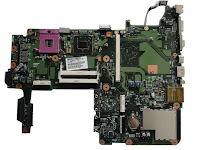PC Motherboards
The motherboard inside the pc is sometimes called the main board, or the system board. It is made up from several components including the central processing unit (CPU), the memory slots, a video section, and some others but these ones are the main parts to be able to get the pc working. Every component on the motherboard deals with a specific activity. Motherboards are divided into the following two main categories.
Integrated motherboards
Integrated motherboards come with all the essential components built in to them. The major advantage of this type of motherboard is that all major functions This means that all the functions that your pc needs are all ready from the getgo on a single circuit board. As the price of pc technoligy has dropped over the years, there has been a big push towards intergrating allmost every aspect of a pc onto the motherboard. Although the only drawback is that if one of the components breaks you will have to replace the whole motherboard. However, this rarely happens. Another drawback i have found though than can be a challenge is that sometimes the expansion slots for future upgrades of the motherboard or new components can be limited.
Non-integrated motherboards
Non-integrated motherboards don't have most of the main components built into them, but they normally have more expansion slots to allow you to add your own. This can be preferable for high performance PC users. They may want a more advanced soundcard, or a top of the range network card, or video card if you are a serious pc gamer. The downside of this type of motherboard is that you need a larger case, and experiance pluggin components into the mainboard.
Designs of the Motherboard
Form Factors are the design of the motherboard. It is how the components of the mainboard are laid out, and especially what what type of case they fit into, and so what power supply they will be using.
ATX
ATX stands for Advanced Technology Extended. ATX was designed by Intel to allow easier expansion, and a higher degree of compatability amoung component manufacturers, while still allowing the main components of a pc intergrated into the motherboard. Its like the best of both intergrated and non intergrated motherboards. There is specific design changes that have taken place over the yearws in motherboards and since the ATX is one of the most recent, you can see that the journey of motherboards has sometimes been drastic difficulties, including where the expansion slots are in relationship to the processor. It used to be that some motherboards couldn't have new components added to them, as there was no room becuase of other parts of the board. The power supply connector for an ATX board is a 20-pin, and can support soft power off.
Micro ATX
The Micro ATX Form Factor motherboard is much smaller than ATX. The maximum motherboard size is 9.6" × 9.6". Micro ATX uses a compact design, which is favoured by pc manufacturers, who like to focus on space saving pc's and designs for their customers. Typically their custoemrs are not pc enthuasats who prefer to get their hands dirty. This is the reason and shift from a few years ago when a pc was an enourmous tower, to the slimline versions that you see now. Normally the board will have more USB peripherial slots to allow external devices to be connected. There is also an even smaller version of the Micro ATX which is called the flex atx. This is a motherboard at the size of 9.6" × 7.5". Don't expect to be able to add a pumping hot hardcore graphics card to motherboards like this.
BTX
The BTX Form Factor is the smoothest and quietiest of motherboard designs. It was designed to make sure that heat that is generated from the components is not concentrated in one place, and the motherboard can be kept cool by the primary airflow from the pc power supply.
NLX
NLX or New Low Profile Extended Form Factor, was the first effort of motherboard manufacturers at fitting slimline cases. The way they done this was to add riser exapnsion slots, which meant that the components would be parrarell against the motherboard. This style was not popular amoungst consumer of manufacturers, and quickly became replaced. Thats the reason you have probably never heard of it. However the concept may return in the future, once the issues of heat, and expansion are solved. It certainly is a good way to compact components into a small amount of space.



No comments:
Post a Comment